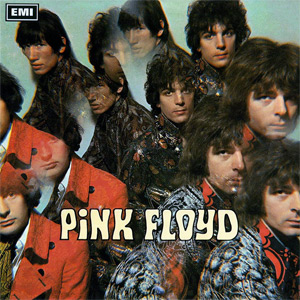 Pink Floyd holds the distinction of being one of exactly two bands of the post-Beatlemania rock era that ended up sounding nothing like their first LP. (The other one is the Moody Blues, who went from a typical R&B combo to spearheading a prog-pop style, but once again, we’re getting ahead of ourselves.)
Pink Floyd holds the distinction of being one of exactly two bands of the post-Beatlemania rock era that ended up sounding nothing like their first LP. (The other one is the Moody Blues, who went from a typical R&B combo to spearheading a prog-pop style, but once again, we’re getting ahead of ourselves.)Even Roger Waters will admit that the band began as an outlet for Syd Barrett’s guitar and surreal lyrics, and his unique vision truly dominates The Piper At The Gates Of Dawn. He established their status as a “space” band, thanks to “Astronomy Domine” and the lengthy freakout “Interstellar Overdrive”. But more than anything he drew his lyrical influences from a wide variety of literary sources, as displayed in “Matilda Mother”, “The Gnome” and “Chapter 24”. Syd’s sadly nostalgic views of bucolic childhood would dominate his life. (Roger’s first recorded composition, “Take Up Thy Stethoscope And Walk”, pales in comparison.)
Still, despite his dominance, it’s obvious that the band knew how to keep up with him. Rick Wright’s swirling Farfisa organ helps paint fitting backdrops throughout, supported by Nick Mason’s drums and Roger’s exploration of the bass fretboard. The space songs utilize incredible dynamics, and “Lucifer Sam”, “Pow R. Toc H.” and “Bike” are pretty solid rock.
Because of typical (for the time) transatlantic record company surgery, most Americans heard a truncated and reshuffled version of the album upon its initial release. Seven years later, when it was reissued as one of the two LPs in A Nice Pair, the sequence was restored, but a later Syd-less live version of “Astronomy Domine” was substituted for the original studio track. The CD version finally made the British LP the standard, re-established by the 40th Anniversary Edition, which has the mono and stereo mixes on their own discs, plus an extra disc of contemporary singles and alternates. Four of those singles were written by Syd, and include such tracks essential to the story as “See Emily Play” (included on the original American LP) and “Arnold Layne”.
Pink Floyd The Piper At The Gates Of Dawn (1967)—4
40th Anniversary Edition: same as 1967, plus 20 extra tracks
Arguably, a third band which would fit your description in the first paragraph is Renaissance.
ReplyDelete